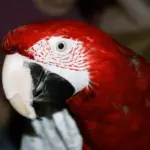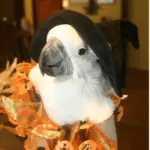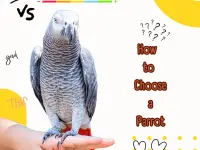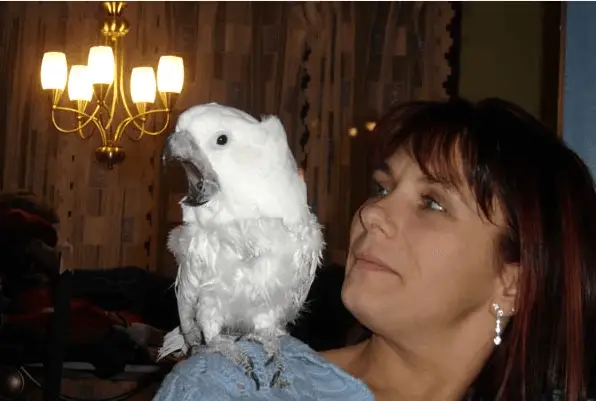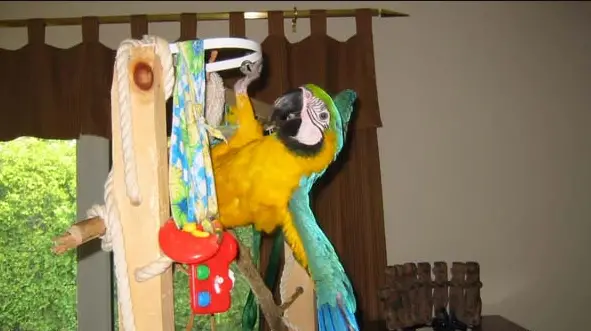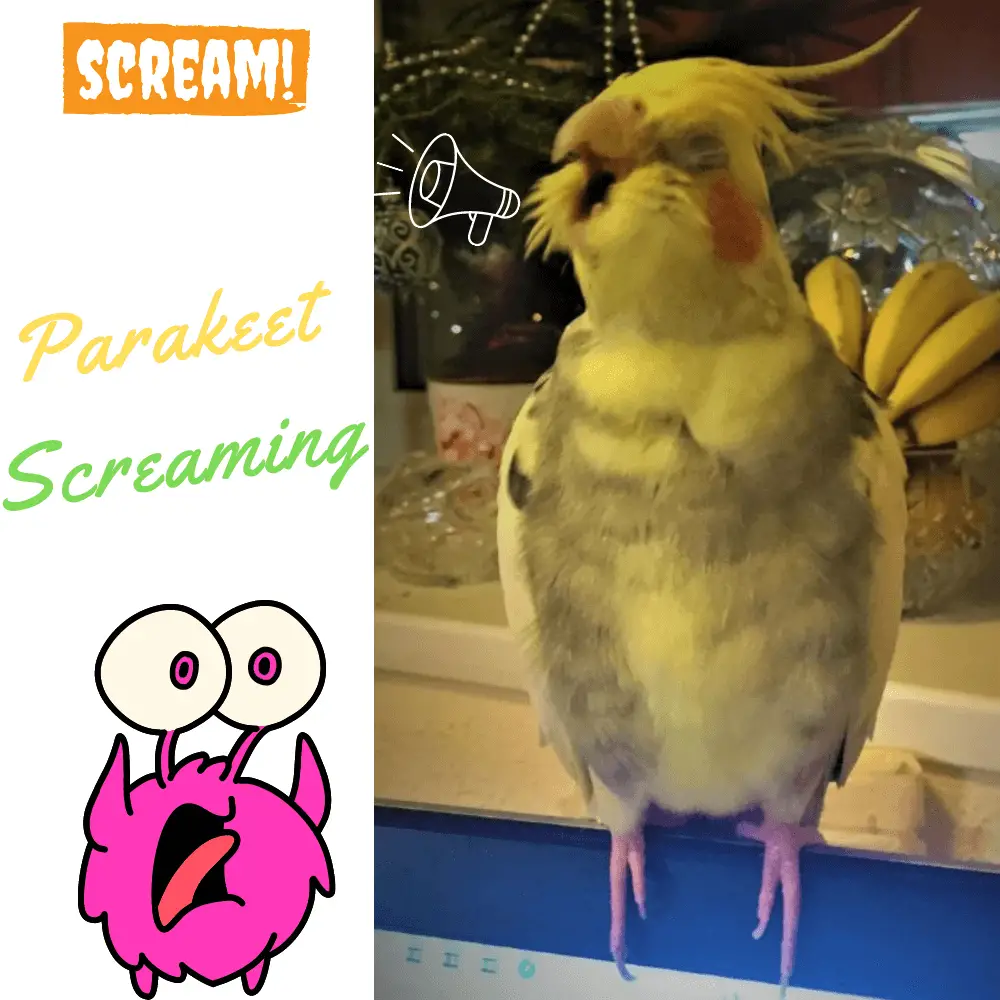
Parakeet screaming: My parrot screams, screams as soon as he doesn’t see me anymore, my parrot screams for hours I don’t know what to do, my parrot can’t stand staying in his cage when we are in the house, my parrot doesn’t play with his toys but screams non-stop… etc… etc… etc… there would be so many examples to tell.
But actually, why does a parrot howl? in books can often read that it is for lack of attention, lack of objects to keep the beak busy, a boring environment, the bird being left alone for several hours a day, hunger in the young bird, an environment too stimulating (loud and continuous noises)… all this gives a feeling of guilt to the owner, he did not do something.
This is not wrong. But why does he continue to shout when this lack described in the books has been remedied?
We simply forgot to say that shouting is the innate form of communication of the parrot. In nature, the parrot which is a gregarious animal screams (howls) in order to communicate with its congeners in the houses, it is with us that it does it.
It is with his parents that he acquires the sounds used for communication linking him to other members of his social group. These sounds and various vocalizations will serve as signals to keep in touch, indeed, when he moves away from a little, will no longer see others, will find food, arrives a danger, the calls will be different.
Listening to these different sounds from his parents, their imitation is part of his socialization in nature.
Without the learning of his calls, left alone to himself he is lost, because in nature a parrot alone is a dead parrot.
It is prey and not a parrot predator.
What about in our homes?
First of all, “a parrot never screams for no reason.”
In general, a newly arrived parrot is always more or less quiet and sociable, because it is destabilized by the change it has just experienced, it must find lairs. It’s only a few weeks later that he becomes himself again and you suddenly wonder why your parrot has become so noisy.
What if my parrot demands more attention with its screams?
There are all kinds of ideas or recommendations that you can read in books or find on the internet… I will give you a small summary, it can sometimes be useful
– You took him out an hour or more, when you put him back in his cage, he keeps screaming and becomes very agitated. The best is to leave the room as soon as he starts screaming and not go back until he has stopped. There, you have to hold on, otherwise, if you give in, you will reinforce this behavior. If your parrot behaves like this, first place a treat, pine cone, branches so that it takes care and entertains itself during your absence. When he has calmed down, go back to him and congratulate him, scratch his head if he appreciates it. He will learn to associate this pleasure with good behavior.
– If you are at home all day, you take care of him and he screams a lot in the evening. Maybe because your children and your partner have returned and you give them some of your attention. One of the solutions is to make a dark cover and cover part or all of it a little earlier in the evening.
CAREFUL!!! only if the bird has received enough attention during the day.
It will not work if the bird stays in the same room as you. Getting into the habit of covering a bird because it is noisy is not a solution in itself. It will work the first few times, then he will scream even more beautifully.
We must seek to discover the cause of the problem and correct it.
In no way should the parrot be excluded from your life, or family.
– You must also differentiate between screams seeking your attention and screams caused by fear. A frightened bird adopts a different, more insistent tone. These cries can occur when someone unknown person, animal, object, noise, new toy… appears before him. These stressful situations can be prevented by thinking and observing your parrot a little. Do not allow strangers to approach or touch the cage. Even if it’s your close friends or family. Respect a boundary between them and him… he must gradually be taught to know the new people, pets, toys around him.
– Look, listen, observe!
It is in the course of the first year that new parrot owners learn the most about their bird. There, you will most certainly discover that it gives you clues before you start screaming, a certain sound that you will be able to recognize. If you go at that moment to see him congratulating him, scratching his head, giving him something to occupy his beak, he will no longer think of screaming.
I will now develop some very specific cases.
My parrot screams as soon as I leave the room!
First of all, the parrot is a gregarious animal, so not programmed to live alone. That means two or more in order to survive. It is therefore normal that he panics as soon as he finds himself alone or no longer has eye contact with you, he then tries to keep an auditory contact, and he calls. There, depending on the species of your parrot you can respond with a whistle, a word, a song. Always the same for the same action.
– Ok, I’m busy, I’m in the kitchen, etc…
Before all this, it will be important to make your home known. Take him with you and show him around the kitchen, the living room, the bedroom, the office… in nature, they have different sounds to recognize where others are, they know their territory perfectly, they have a very repetitive rhythm morning, noon, afternoon, evening. They always do the same things at the same time. One sound, one answer from the other is enough for them. In our houses, you have to teach your parrot to recognize its territory, naming room by room, so, later when he calls you, you can answer him “everything is fine, I’m in the kitchen”. And it can also later join you in the named places by flying.
Some examples to evolve the cry of your parrot. With an African Grey Parrot or amazon parrot or cockatiel or lovebird, or Eclectus or Timneh, it will be easy when he shouts to teach him a song chorus, whistle a tune of music that you like he will imitate it in order to join you. A cockatoo, on the other hand, is a poor singer or whistler if he tries, it will be worse than hearing him scream on the other hand they have an excellent sense of rhythm, you just have to clap your hands and they will dance. It is also possible depending on the case to teach them a rhythm with “tata tata”, “lalalala”…
With macaws, it will be necessary to listen to them, observe them, and seek to entertain their attention with deposited treats, branches, or other toys before they begin to scream.
My parrot screams when I leave the house!
It’s actually the same problem, you get out of his eye contact and it’s complete panic because he doesn’t even have sound contact anymore.
He only asks to understand what is happening, and why he finds himself abandoned by his social group. In captivity, its survival, and safety depend directly on you. There is no need to explain in detail what you are going to do and why. He doesn’t understand anything at all. What is important is the notion of time that a parrot has, unlike dogs and cats.
It is therefore necessary to teach him this notion of various times for one thing or another. In order for him to be able to anticipate them, it is necessary that these notions of a more or less long time are learned. Here are some examples.
– I’ll throw away the trash – short
time – I go to the supermarket – medium
time – I’ll go shopping, work – long time
Why does my parakeet scream
It can be in other words, it will depend on your family, schedule, etc…
What is important is to always use the same words for the same things. Otherwise, very quickly your parrot will not trust you and this may develop stress and anxiety.
If you don’t know when you’re going to go home, then use a longer term than would be appropriate.
One of my greys at home when she sees me putting on my shoes asks me “where are you going?” When I go in the morning to feed them they immediately differentiate whether I stay at home or go to work, this to the clothes I wear, because I taught them by talking to them about the difference.
My parrot has a large cage or aviary, a perch, toys, and yet he screams when he is not on me…!
For a parrot, it is not natural to take care of itself. In nature, they always do things with two, fifty, or more hundred parrots. So in captivity, staying alone in your cage, on your porch, or simply playing with color schemes that you have most certainly paid dearly for is not natural. The fact that he does not want to stay alone and screams is not a whim on his part, it is an innate reflex of his species in a different environment, he transposes it by the cry, the most effective way he has learned in contact with the human.
In most cases, it is not difficult to notice a lack of socialization. In this case, he does not know what all the objects you have garnished his cage for, a not or poorly socialized parrot has not developed his curiosity, for lack of stimulation and exploration, he does not know how to take care of himself and for fear of any novelty.
As you will certainly have already understood, it is not innate for a parrot to occupy itself alone, explore alone, wait alone, or find itself in unknown situations alone.
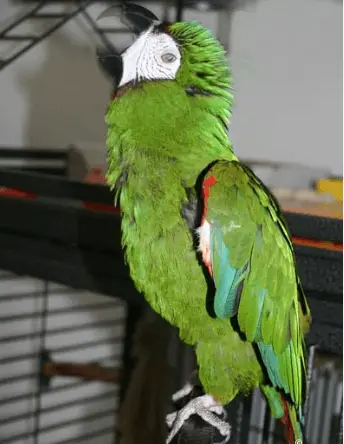
It is therefore necessary to teach the parrot this notion of waiting and activity alone. Every time we ask him to wait, every time we ignore him, every time we don’t have time, he doesn’t understand. And he will use vocalizations (screams, screams) to get your attention. This will be correct and normal behavior for him. It is the human by his behavior that gives him reason to act in this way.
You don’t just have to buy a super sophisticated toy and put it in your cage, you have to show it, explain how to use it, play with it, make him touch, chew, or teach him how to use it for the most complex. He will then understand the principle and when you introduce him to new ones, he will be curious to find the use himself, he will develop his desire to learn, his sense of curiosity.
He will gradually learn to play alone while you go about your daily business.
A few simple tips:
– Serve him his fruits and vegetables at the time of your meal
– Give him cardboard to pick up from the bottom of his cage or branches.
– An old phone book above its cage or perch
– One or more newspapers to “read”
– A peanut or a nut is hidden in a small box
– A pack of tissue or a roll of household
paper – ……………
There are thousands of little things to recycle as parrot games.
Once you have taught him to play with the games you present to him, you will still have to teach him the notion “I am busy”. He has to learn to play alone, whenever you can’t do it with him. First of all, he will have to learn to do it by seeing you. You will tell him “I am busy” or “work” or “I have to do”… always the same word, the same sentence, it’s very, very important.
IF during this time, he screams, flies at you, clings to your shoulder, your pants, calmly you bring it back on his cage, on his perch, where his favorite toys are, telling him the chosen sentence again. And you go back to your business.
You have to do it gradually, the first time you will be busy for a few minutes, two, then three, then five, then ten, etc. When you’re done, you go to him and say, “I’m done,” “I’m done”… and you play with him for a while, give him attention.
You will see that he will learn very quickly this notion of occupied and finished. And he will accept this notion of playing and acting in the middle of his social group as natural.
When your parrot understands this, you can start having auditory, visual contact again without him expecting every time you take it on you, with you.
You will be able to gradually introduce more complicated games with colors, shapes, etc …
My young parrot screams non-stop!
I would now like to talk about young parrots weaned too early, raised by hand, separated from their congeners, and asked to stay a large part of the day alone.
In the wild, they would still fly with their parents, and this for some species for more than a year, in any case, several months, feeding on soft food in large quantities, more than an adult bird.
These birds need very much attention from their humans. Left alone for several hours during the day, he feels abandoned and when his owner returns, he screams for attention and often because he is hungry. These birds weaned by force, far too soon are permanently hungry and leave them with a feeling of abandonment, and anguish. Weaning them with seeds or granules at a very young age is very dangerous. Spoon feeding them again every night (see more often if necessary) helps determine how hungry they are or can’t yet eat on their own.
A barely weaned parrot should not just have seeds or granules, it should have soft foods such as pasta, banana, apples, soft vegetables, cooked corn cobs, rice, or beans …
Spend as much time as possible with him, he needs physical contact with a human in the absence of his congeners. Stroke his head, take him on your lap while you watch TV, read a book…
And above all, if you can not spend a minimum of two hours a day with him, should leave him alone more than five hours a day, it will be better to think about entrusting him to someone who has more time to devote to him.

Parrot scream
Screaming is the first form of innate communication for the parrot. Whether in nature with its congeners or with us in our homes, a screaming parrot ( read howls ) always tries to communicate, to express something.
One of the learned forms of communication is learning link calls. In its natural environment, the young parrot learns the vocalizations which will serve as signals to keep in contact with its social group. These vocalizations are learned by listening to and imitating parents and members of the social group very early in the socialization of the young parrot.
If bonding calls to keep in touch are part of the bird’s innate behaviors, the vocalizations that compose them will be acquired. These will be part of the individual baggage of the bird and will depend on what it learns and retains from the environment in which it will evolve, according to the answers it obtains. Many different modulations and sounds will thus be assimilated ( if they are relevant if they allow communication ) in order to be able to maintain close relations with the group.
It is in the nature of the parrot to want to communicate by vocalizations and it is therefore normal that this acquired part of liaison calls is also transposed in a context of domesticity.
Parrot screaming for attention
He will learn the everyday, familiar sounds that serve to attract attention, stay in touch, or communicate a desire or frustration, and will naturally remember … those that work well ( for him ).
The parrot expresses itself and you must try as best you can to decipher this language by understanding that it is a call, a communication, and trying to understand what your bird is trying to notify you … No small task! If you ignore these vocalizations it may escalate and that’s when the link calls will turn to screams, what am I saying – link howls.
There is a multitude of sounds ( calls ) that define your parrot’s moods. The modulation of the call or cry will be different depending on the circumstances or the emotions involved.
- Locate the members of his social group. The parrot will make link calls in an attempt to locate its human-pet or members of its party in the house. Sometimes a simple answer will suffice and he will return to his occupations. Other times, he will simply want to come to join you and he will know, by your answer, where to find you ( if he has the possibility of course ).
- Alert or distress vocalization. A normal parrot screams when suddenly confronted with what seems threatening: a new object, a stranger, a sudden noise, etc. This is not abnormal behavior, it is an ancestral alarm situation transposed into a domestic context that serves mainly to warn one’s group of probable or imminent danger. We are not talking about behavioral problems here. These types of calls are very defined and circumstantial ( fear of dogs or large birds outside, the arrival of a car in your parking space, a walker on the sidewalk in front of your home, etc.). On the other hand, if your parrot frequently emits this kind of alarm call, you will have to reassess the bird’s environment; it is not normal for a parrot to be in constant distress.
- Exclusion. Nothing worse for a social animal that depends on its group for survival. The bird is isolated from the group, and it tries to locate you or let you know its position in the house. The parrot being a gregarious animal, it simply does not support exclusion. At this time, he will make small liaison calls ( usually the words he knows: hello, how are you? Are you coming from? Kisses, etc. ). If he doesn’t get an answer to those repeated calls, he’ll slowly raise his voice, and if the gentle method doesn’t work, he’ll use the full-bodied… the one that works every time. If you wait until this extreme to react, the bird will remember ( stupidly) that he must scream at the top of his lungs so that we deign to come and take care of him a little. He just learned to shout to communicate or have your consideration, since that’s when he caught your attention.
- Environmental influence. You should never minimize the very strong empathy of parrots. Often the atmosphere or the ambient animation in the house has a ( very ) direct impact on the sound level expressed by the bird. Your parrot cannot remain impassive in the face of bickering children, the TV or radio playing at the top of their lungs, or the dog who keeps barking in the yard. If there is action in the household, the parrot will be sure! Also, never forget that screaming is a natural means of communication for the parrot and that if you go overboard by yelling at it in an attempt to impress and silence it … it will simply conclude that you are communicating with it and he will try to imitate the power of your voice… In this game, believe me, you are no match for the competition.
- Taxi. A parrot with trimmed flight feathers needs a means of locomotion around the house. So what is he doing? He calls his taxi! And if the taxi doesn’t arrive quickly, the parrot isn’t the type to give up; it will call for as long and as long as it takes… Better to leave Coco its natural modes of locomotion ( wings ), it will gain autonomy and you will gain peace of mind!
These calls, which are used in normal situations, can quickly escalate depending on the responses you offer the bird. Indeed, as an intelligent animal, the parrot runs the risk of quickly understanding how it can influence the behavior of those around it … to its advantage, by using strategic sounds in order to receive benefits. Make sure you send your parrot the right messages, the ones you want them to remember … Many parrots learn pretty quickly to get what they want from their human by howling since some people would do anything to do it. silence the bird by giving it exactly what it wants the moment it runs. Indeed,
Usually, the parrot does not cry for anything. There is always a reason ( at least, according to his point of view ), all his actions result from very specific motivations. Sometimes it can be difficult for us to discern what makes our bird squeal: what may seem very harmless to us may have a whole other dimension for our parrot.
A sporadic squeal is perfectly normal, remember that it is an innate means of communication and that even the most socialized of parrots will occasionally use this means like a link call to locate you. At that moment, a simple answer, such as: “I am in the kitchen”, will know how to satisfy your bird, as long as you have taken the trouble to show him around and know his territory beforehand.
The important thing here is not to unduly reward this behavior by giving the bird the desired attention. If we react to this kind of behavior either by shouting at him more beautifully or by responding in a positive way in his eyes ( coming toward him, offering him a treat to silence him, and … etc. ), we confirm it in this attitude and he will only retain that: if he wants attention ( or anything else ), he has only to express it loud and clear!
Of course, you have to put things in perspective. Whether it’s a very young parrot or a crying baby, the situation calls for immediate attention – a cub never screams for anything; on the other hand, your reactions to a behavior of this kind coming from a more “experienced” parrot will require more reflection on your side before making THE unfortunate gesture … Only a poorly socialized parrot, “insecure”, anxious, dissatisfied, even overwhelmed, will cry loudly, persistently, repetitively for no apparent reason or even because he does not know how to react in the face of even the most mundane situation. Up to you!
5 Reasons Why Your Parrot Screams HOW TO MAKE THEM STOP!
SOURCE:Parrot Playhouse

